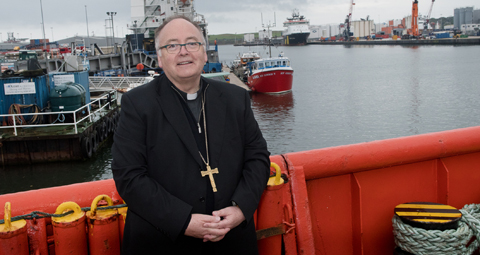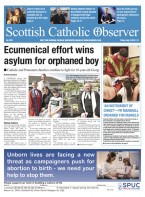July 6 | ![]() 0 COMMENTS
0 COMMENTS ![]() print
print

The stars of the seas
EUAN MCARTHUR speaks to Bishop Stephen Robson about the work of the Apostleship of the Sea, a charity which began on the Clyde almost 100 years ago, and is still reaching out to sailors in need.
Bishop Stephen Robson loved listening to stories of how Apostleship of the Sea (AoS) helped seafarers. Now, as the charity’s bishop-promoter for Scotland, he finds himself moved every time he witnesses first-hand its mission being carried out.
Bishop Robson was often regaled with anecdotes from Bishop Peter Moran, his predecessor at the charity, whom he replaced in February 2015, and since then he’s embraced uncharted waters to the extent he’s brimming with passion to improve the plight of many who venture out to sea to earn a living.
It didn’t take long for the Bishop of Dunkeld to grasp just how vital a role he had assumed in endeavouring to assist those arriving on these shores, something he has experienced in his own diocese when foreign sailors are taken to Mass in St Andrew’s Cathedral, Dundee, by volunteer ship-visitors.
As parishes prepare to celebrate Sea Sunday around the country on Sunday July 8 and acknowledge the reliance of everyday goods which arrive by sea but can sometimes be taken for granted, Bishop Robson feels privileged to be a leading advocate for AoS here in Scotland, where it all started almost 100 years ago.
He recalled: “Our previous promoter, Bishop Peter, is a very good friend of mine. He used to speak so warmly and happily about Apostleship of the Sea.
“To be honest, I didn’t really know all that much about AoS before being appointed Bishop Promoter for Scotland, other than the fact it was founded in Glasgow and the kind of general work it done, but I soon began to realise how important a mission it is.
“You just have to look at the number of seafarers who are Catholic and come to this country from places like India and the Philippines, and a lot of these men leave their families back home to come away and work for a long period of time.
“Not everyone is impervious to feelings of loneliness. Some of the guys are struggling a bit. We’ve got ship visitors who bring them to Mass and it’s just nice to meet them and have a chat.
“It struck me as incredibly important how much work is done to help these people keep in contact with their families, especially when they are experiencing difficulties in communications.
“There is somebody there to try and defend them when things go wrong.
“We only need to look as far as the crew of Indian lads from the Malaviya Seven who were left stranded in Aberdeen not so long after their ship owners went bust and gave up on them.
“It strikes me that there’s a lot of abuse among some vulnerable seafarers in a foreign land when it comes to issues of pay, justice and sickness.
“Apostleship of the Sea is so good about that, assisting them practically and spiritually.
“What happens if a seafarer’s wife dies or one of their children takes ill? They need emotional support from AoS chaplains.”
Bishop Robson is an ideal fit for AoS. Having spent some of his early priesthood years in Our Lady of the Waves Church in Dunbar, he has had a natural affinity with the sea from as far back as he can remember.
His entire family, in fact, were steeped in a rich seafaring tradition which inevitably brought its own dangers and challenges.
He explained: “My Dad had a part-share in a fishing boat when I was a child. As a kid, we used to go to Dunbar and when I became a priest, that’s where I spent a lot of my time.
“I was a wee bit nervous of the sea when I was a wee boy but Dad had a great love for the sea as he’d been in the Royal Navy and in the war in the Far East. My great uncle—my grandfather’s brother—was a seafarer all his life. He started off as a cabin boy on Fyffes banana lines. He was 105 when he died. He worked himself up and became the commodore of the fleet.
“The interesting thing was when we were growing up, he used to tell us stories about the war when he was in charge of the Atlantic Convoys when they were bringing food and provisions from the United States to our country.
“He wrote a book which my mother has a copy of at home and it reminds us how dangerous that whole mission was.
“They were often traced by U-boats and picked off by aeroplanes.
“They were constantly in difficulty, quite frightening really.”
When the opportunity arises, Bishop Robson enjoys going on a cruise and is well aware of the growing presence of AoS from his travels across the world.
From its humble origins back in 1920 when it was founded on the banks of the Clyde in Glasgow, the Catholic charity now has a presence in more than 300 ports worldwide and that’s a fact that fills the bishop with much satisfaction, although he’s been forced to endure some frustration as well.
“One of the thing which impresses me is the fact it’s an international organisation and one that’s growing,” the bishop said.
“Actually, last year I was in Taiwan, Japan and Korea. The first thing I saw when I stepped off the ship in Korea was Apostleship of the Sea.
“Korea has quite a large Catholic population and I saw it as well in Nagasaki in Japan. It’s genuinely very impressive to see AoS so widespread in its work. I just love being by the Sea and have been on cruises for the last eight years.
We used to go with one particular cruiseline which I won’t mention.
“There were six priests and we always liked to provide a Sunday Mass for the people on board because very few cruise lines have resident chaplains.
“We used to say a Mass for the crew at about 11pm, midnight or even 1am as that was the only time they were able to attend, particularly the Indians and the Filipinos who worked such long hours and were desperate to go.
“But they stopped that as well and really we’ve had increasing difficulty over the years to say Mass.
“The first thing I actually noticed was the stuff we used like the chasuble for the Mass was supplied by Apostleship of the Sea. But they weren’t allowing us to say Mass onboard the ship, which I found quite sad. At one time they must have allowed it, because the vestment from AoS is quite distinctive. You couldn’t help but notice it.”
Closer to home, the World Congress is coming to Glasgow in 2020 to mark AoS’s centenary, providing the opportunity to celebrate its past while looking to the future. During September, Scotland hosts four Stella Maris Masses and their bishop-promoter led their celebrations for the inaugural Mass in St Mary’s Cathedral, Edinburgh, last year.
Bishop Robson said: “We’ve starting expanding the annual celebrations to raise the profile. We have our Stella Maris Masses in all the big cities in Scotland once a year to highlight the importance of the mission. After all, we have big ports here in Aberdeen and Grangemouth where there’s a lot of oil commerce and merchant shipping. It’s very important now that we have Masses in Glasgow, Aberdeen, Dundee and Edinburgh and we’ve also expanded our mission into Argyll and the Isles.”
“We’re hoping our centenary celebrations in 2020 will broaden things even further, and looking for support from our parishes.
“The Sea Sunday collection isn’t always taken up but hopefully that changes. It would be great if everyone in Scotland was not only aware of the mission, but the fact it was started here. It’s something we should be proud of. What we want is for everyone to celebrate that with as much verve and enthusiasm as possible.”
‘They are nice people who are being treated abysmally’
By Joanna Magoufakis
The Apostleship of the Sea (AoS) has been around for almost a century. Its passion and success in helping seafarers has made the organisation a worldwide symbol of hope. Its volunteers travel far and wide to assist people in need who find themselves in dangerous waters.
The story of Zlatko Kosack highlights the remarkable work AoS is doing in Scotland. Mr Kosack is a Croatian engineer who suffered a terrible accident while working on an oil tanker in Grangemouth. He was burnt from the waist to his legs and required skin grafts.
The chaplain of Clydeport working for the AoS, Deacon Joe O’Donnell, provided him with care, and made arrangements for his wife, Vesna, to stay in suitable accomodation and have access to all necessary facilities to support herself and her husband.
The couple were so grateful for the support that they decided to volunteer for the charity as a way of saying thank you.
“[Joe O’Donnell] has been there for us in such a huge way that we would both love to try and give something back to AoS by
volunteering in some way when everything is back to normal,” Vesna said.
When ships or boats from abroad get stranded on local waters, AoS is there to help. In 2016, the Malaviya, a ship from India, became stranded in Aberdeen.
Deacon Doug Duncan, the Aberdeen port chaplain provided the 15 Indian nationals with all AoS could offer. This was a hard time for the seafarers who had not been paid for months and were ultimately stranded for 18 months.
“It’s an anxious and stressful time for the crew but having someone from AoS they know and trust support them makes a difference,” he said.
AoS has also helped rescue many fishermen from inhumane working conditions, including nine fishermen near Portsmouth Harbour. Three men from the Philippines who were living on a boat in ‘slave-like conditions’ were also rescued thanks to the efforts of AoS. Often, people working as fishermen are victims of labour exploitation and AoS is trying to identify the signs quickly so its volunteers can assist those affected.
The charity fights for justice and human rights, and is seeking to promote fair trade. However, many ships sail the seas from countries which are not members of the United Nations, making proper regulation difficult.
Fr Bruno Ciceri, director of the AoS for the Pontifical Council for the Pastoral Care of Migrants and Itinerant Peoples, said: “Taiwan, for instance, is not a member of the United Nations and it is not obliged to follow UN conventions on the fishing trade.
“We talk a lot about ‘fair trade.’ I don’t know the day when we will have ‘fair trade’ also in fishing. That will make a difference.”
Deacon Stone, a permanent deacon stationed in Southampton, will always remember the Filipino fishermen. He described their rescue as ‘a landmark thing in my life because they are such nice people being treated so abysmally.’ For his heroic efforts he was awarded the British Empire Medal.
The Apostleship of the Sea has become the Catholic Church’s biggest seafarer charity and the work of such charities has been recognised by Pope Francis. In a first ever Tweet for Sea Sunday, the Holy Father wrote on July 9: “I entrust sailors, fishermen, and all those in difficulty on the seas faraway from home, to the motherly protection of Mary, Star of the Sea.”











